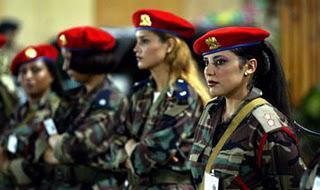
When I first heard about the death of Libyan Dictator, Moammar Gaddafi (who seems to be America’s favorite frenemy) my thoughts went to the women of Libya: what would it mean for them? I quickly realized I had no idea. I searched my mind, trying to remember what I’d heard about Libyan women in the news in the past months.
The fact is, I hadn’t heard much at all about Libyan women, because Libyan women are complicated. Okay, all women are complicated (I feel like this could be the title of a book), but the women’s rights situation in Libya is especially complex, because it turns out, Gaddafi was in many ways a supporter of women’s rights—and yes I cringe a little when I say something as general as this…after all, it’s complicated.
Most interesting to learn was that Gaddafi paved the way for many women to enter into certain male-dominated professions, namely the police force and military. In response, many Libyan women felt immense gratitude for and loyalty toward Gaddafi. This Huffington Post article describes Nisrine Mansour, a 25-year-old policewoman with a picture of Gaddafi as her phone background and a pro-Gaddafi song as her ringtone. Mansour is apparently not alone in her support for Gaddafi, as many Libyan women in the militia and police think they owe their careers to the dictator.
Gaddafi also believed in promoting women to higher positions, as a way of publicly demonstrating his policies. Such women included the Amazonian Guard, a group of highly trained female bodyguards (who often dressed like fembots—forever the theatric, that Gaddafi) as well as prominent women officials such as Huda Ben Amer, a former appointed mayor of Benghazi. Ben Amer is famous for having attended the hanging of a political prisoner, and tugging on his legs to make him die faster. And people think Hillary is tough. Ben Amer gained recognition among the rebels as a universally hated figure and represented much of the brutality of Gaddafi’s regime.
Learning about these women was a surprise to me, because although they clearly represent Gaddafi’s regime for some, they are certainly not what I imagined when I thought Gaddafi. Why? I wondered. Gaddafi was apparently once quoted as saying he promised his mother he would make the country better for women—although it’s probably more likely that he hoped to undermine traditional religious groups with his pro-women policies. It made me wonder about who encountered these women on a daily basis, and I couldn’t help but think of the rebels. Since many of these women found their power in violent jobs (as militia and policewomen) it seems likely that they also found themselves face to face with the rebels in Libya. The combination of these interactions and prominent, brutal female figures like Ben Amer makes me wonder about the rebels and Libyan citizens’ perceptions of women with power. If I often encountered an oppressive regime in the form of violent powerful women, I don’t know how great I would feel about giving women power.
These are all speculations, of course—as most statements made about the Arab Spring have been—but I can’t help but wonder if the political pendulum will somehow swing back to a place where women lack routes to success in Libya. Already, Libyan female supporters of Gaddafi have publicly lamented the lack of female representation in the rebels’ interim administration—only one woman was appointed.
As with most events we’ve seen in the Middle East in the past few months, we really won’t know what’s going to happen until it does. Gaddafi’s belief in women’s empowerment was sometimes expressed in odd ways (see: Amazonian guard), but it had a small, yet noticeable impact.
However, like most things Gaddafi, his policies toward women were erratic, required complete and total loyalty from his subjects, and only went so far. Many women felt left out in Libya’s patriarchal society, despite Gaddafi’s reforms and in part due to his restrictions of freedoms. And of course neither women nor men are better off living in a repressive dictatorial society ruled by decades of fear.
Many factors could affect Libyan women’s lives in the coming months, such as the religious leanings of the rebels, but one thing is certain—some of Gaddafi’s strange female bedfellows have lost an ally.
Originally posted on Rachel Simmons’ blog. Fiona also writes for her own blog, Barbara’s Angels

